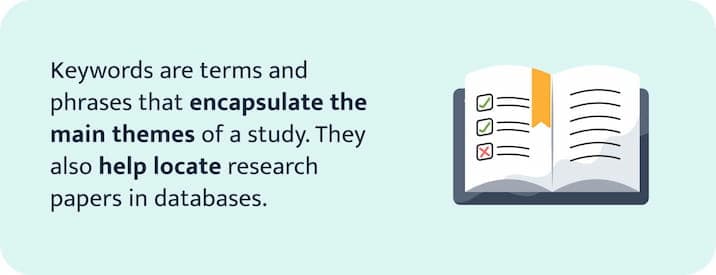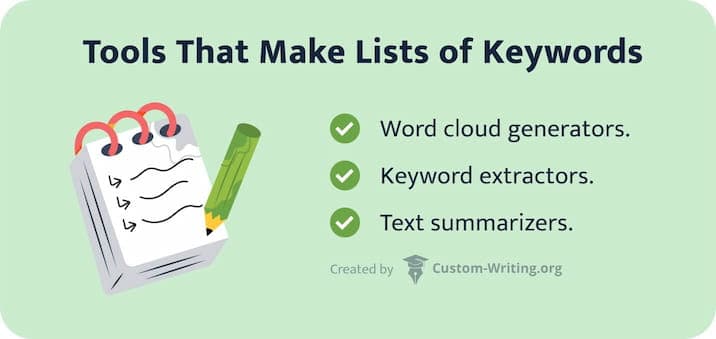Free Abstract Keywords Generator
Looking for a way to create keywords for your research quickly and effectively? You've come to the right place! We present to you our brand-new abstract keywords generator. This powerful tool will save you time and improve the quality of your research. Let's see how it works!
✨ Benefits of Our Abstract Keywords Generator
Our generator is the best tool to handle research keywords. It has multiple advantages:
| 💸 Free of charge | Use our tool for free! |
|---|---|
| 🤖 Smart AI | This app is smart and innovative. |
| 🤩 Easy to use | Our generator has a convenient interface. |
| ⏱️ Time-saving | It will help you save time. |
👍 How to Use Our Keyword Generator from Abstract
Create a list of keywords in 3 easy steps:
- Paste your abstract or the text of your research into the field.
- Specify how many keywords you want to get.
- Press "Generate now."
And there you have it!
🔬 Keywords in Research: Definition & Importance
Keywords are phrases you enter into a search engine when looking for something online or in a database. If they are present in a text, it's likely that this text has what you're looking for.
It's also possible to use keywords to find relevant academic publications. If you want people to discover, read, and reference your writing, keywords are just what you need.

There are many other reasons to use keywords when publishing research, such as:
- People can use keywords when an adequate official indexing term may not yet exist.
- Keywords help editors examine your work for relevance to their journal's requirements.
- Using a potent keyword combination will make the audience less likely to reject your work.
But it's not enough to use random phrases related to your topic. If you want to gain a positive effect from using keywords, you need to pick them carefully. A rule of thumb is that good keywords are precise and relate directly to your research.
Here's an example of solid keywords compared to bad ones. Pay attention to how narrow and well-formulated the good ones are:
| ✅ Strong keywords | ❌ Weak keywords |
|---|---|
|
|
🔎 How to Choose Relevant Keywords for Your Research
If you haven't yet mastered the use of keywords, check out this step-by-step guide!
1. Consider Your Readers
People from your academic field make up most of your potential audience. They may use the same search phrases you would generally use while looking for references. That's why it's a good idea to put yourself into your readers' shoes and think about what you'd use as search terms to find your paper.
2. Check Your Chosen Journal's Instructions
If you aim to get your paper published in a journal, it's necessary to check its guidelines and requirements. Pay close attention to the following aspects:
- The word limit.
- The use of keywords in the form of individual words or phrases.
- Permission to use abbreviations.
- Any specifications regarding capitalization, punctuation, and spelling.
- Whether the journal, publisher, or discipline requires you to use keywords from a specified list or database.
3. Make a List of Relevant Keywords
We recommend you create a pool of possible keywords and then pick the ones you like the most. You can use specialized online tools or do it manually. The manual approach is a lot harder and more time-consuming. For an automated method, you'll need the following apps:
- A word cloud generator to make a list of popular keywords.
- Our keyword extractor to create a list of keys from your text.
- A summarizer to check the keyword frequency.

Here are the benefits of using online tools over a manual approach:
- A word cloud generator can give you a compilation of popular keywords. If you want to be more accurate, use our AI-powered extractor. It can make a ready-to-go list of keywords from any text related to your topic. If you're going to do it manually, you'll have to hand-pick every word and check if it fits your requirements.
- Our summarizer tool conveniently displays the word frequency—a critical parameter when choosing keywords. If you prefer the manual approach, you'll have to check for keyword frequency yourself.
- When gathering words for your list, ensure that each of them is related to your research topic. With our generator, you can be sure of it, while if you do it manually, you'll have to check every word separately.
4. Keep a Balance Between General and Specific
It goes without saying that you should prioritize narrower keywords. Using general or vague phrases may cause problems with finding your work in databases. However, it's also crucial to avoid becoming overly particular. If you pick too many obscure terms, your audience will also become narrower.
If possible, follow these two tips:
- Try to avoid words like "data" or "study," as there are tons of other research papers that have these two keywords.
- Don't use the same phrases repeatedly. Wary them as much as you can.
5. Use Phrases Rather Than Single Words
To make your work stand out, it's best to be specific when selecting keywords for research papers. That's why we recommend you use phrases consisting of 2-4 words. Single words are not specific enough and using them frequently results in false matches or misinterpretations.
For example, "emission" could mean anything from money printing to toxic pollution. So, if you're writing about global warming, it's better to use "biogenic emission" as a keyword so that everyone will understand what your research is about.
6. Include Terms That Represent Your Paper
We recommend you choose keywords that adequately summarize and reflect the content of your research. To do it well, try the following:
- Connect the keywords to your main topic, gathered data, graphs, and text.
- Add keywords that will highlight ideas or theories you cover in your research.
- Do not use your research's title as a keyword! It's a terrible idea that won't do you any good.
- Verify that each keyword is officially recognized by the research community.
7. Don't Forget about Synonyms and Abbreviations
Another critical thing to consider is how you use synonyms and abbreviations. After all, they can be both your friend and enemy. If your chosen journal allows them and you want to use some as keywords, be careful! Depending on the study field, acronyms and abbreviations can mean various things. That's why it is crucial to check their meanings and definitions.
For example, since SARS has only one definition, it would be safe to use this word if you're writing about COVID-19. At the same time, the term ARC is present in many subjects, including biology, engineering, and computer programming. That makes this abbreviation tricky, as using it can confuse your readers. Keep that in mind when using abbreviations, and you'll do just fine.
And this concludes our guide! We hope that you've enjoyed it. Now, go ahead and try our free abstract keywords generator! Use it to make your research more accessible and unique.
We also recommend using our research question generator and online hypothesis tool to enhance your writing even further.
❓ Keyword Generator from Abstract: FAQ
To write keywords in an abstract, look through your text, summarize its main points, formulate them as short phrases, and take the ones with the highest search frequency. Also, follow the publishing journal's guidelines if there are any.
Keywords are phrases that summarize your work's main points and ideas. They make it easier for potential readers to find your research online or in databases. Additionally, people can use keywords when a suitable indexing phrase might not yet exist.
You can find keywords manually by reading the research's abstract and picking any words and phrases related to the topic. Using an online extraction tool to generate keywords quickly is also possible. You can set desired parameters, and the generator's AI will extract keywords and form a list.
First, you choose the generator that you like. We advise you to use Custom-Writing's tool because it's free and has the best AI. Then, you enter your text and indicate how many keywords you want. Finally, you submit everything and wait for the AI to create a list of keywords. Then, you can copy the results to your research.
Updated:
🔎 References
- How to Choose Keywords for a Manuscript?: Elsevier
- Title, Abstract, and Keywords: Springer
- Guidelines for Selecting Keywords: Kansas State University
- Choosing Keywords: Journal of Medical Internet Research
- Generating Keywords: University of Louisville Libraries
- Keywords & Search Terms: Montana State University